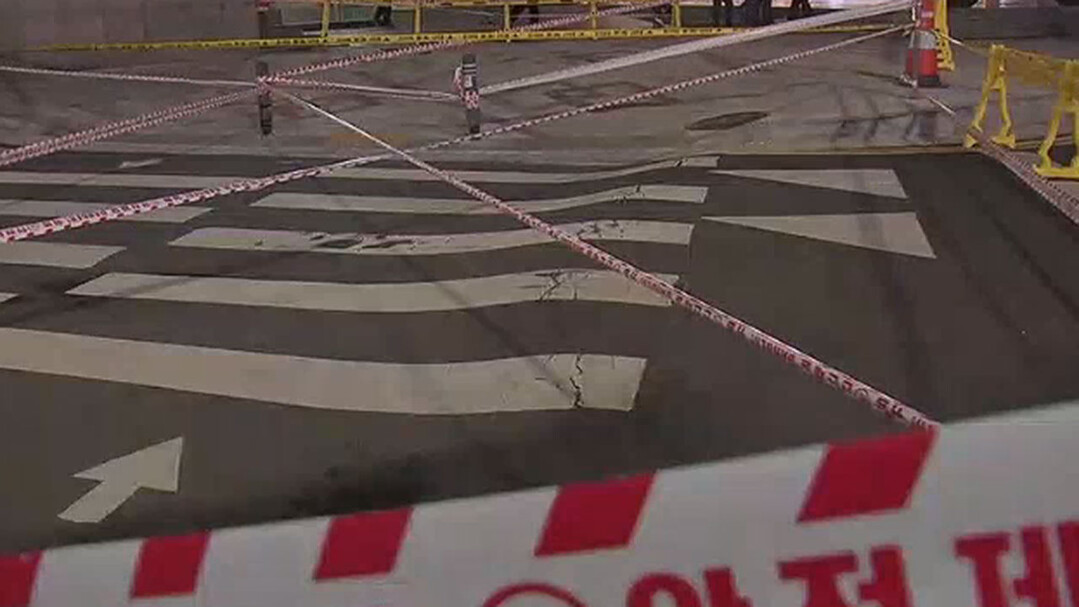
A section of pedestrian crossing near the bustling Bupyeong Station in Incheon, South Korea, unexpectedly succumbed to a ground collapse on the evening of April 15th, triggering immediate safety protocols and initiating a thorough investigation into the underlying causes. The incident, reported by Incheon City officials on the 16th, involved a significant depression in the pavement, measuring approximately five meters in width and ten centimeters in depth. While the sudden appearance of the sinkhole caused considerable concern among commuters and residents, authorities have confirmed that no injuries or casualties resulted from the event.
Upon discovery of the ground subsidence around 8 PM local time, Incheon Metropolitan City swiftly responded by deploying safety personnel to the site. Emergency crews erected protective fencing around the affected area to prevent accidental falls and ensure the safety of pedestrians. Simultaneously, traffic control measures were implemented to divert vehicles and mitigate any potential risks associated with the compromised road surface. The intersection, typically a high-traffic area due to its proximity to a major transportation hub, experienced temporary disruptions as authorities worked to secure the scene.
Preliminary assessments conducted by Incheon City engineers suggest that the sinkhole's formation is likely linked to ongoing underground construction activities in the vicinity. Specifically, the construction of a new underground pedestrian passage is suspected to have destabilized the surrounding soil structure. The prevailing hypothesis posits that the melting of subsurface soil, possibly exacerbated by recent temperature fluctuations or groundwater movement influenced by the construction, led to the erosion and subsequent collapse of the overlying ground.
An official spokesperson for Incheon City emphasized the gravity of the situation and the commitment to a comprehensive investigation. "The safety of our citizens is our utmost priority," the official stated during a press briefing. "We are undertaking a detailed safety assessment of the site and the surrounding infrastructure to determine the precise sequence of events that led to this sinkhole. This will involve geotechnical surveys, analysis of soil samples, and a thorough review of the construction plans and methodologies employed for the underground passage."
The emergence of sinkholes in urban environments is a growing concern globally, often attributed to a complex interplay of natural geological processes and anthropogenic factors. While some sinkholes are naturally occurring phenomena caused by the dissolution of soluble rocks like limestone, dolomite, and gypsum by groundwater, many instances in urban areas are triggered or exacerbated by human activities. 1 These activities can include underground construction, excessive groundwater extraction, leaking water or sewage pipes, and changes in surface drainage patterns due to urbanization.
Incheon, as a major metropolitan area with extensive underground infrastructure, is not immune to these risks. The city has witnessed instances of ground subsidence in the past, prompting calls for more stringent regulations and proactive monitoring of underground construction projects. The current incident near Bupyeong Station is likely to intensify these demands and lead to a renewed focus on infrastructure safety and management.
The planned "thorough safety inspection" by Incheon City authorities will likely involve a multi-pronged approach. Geotechnical engineers will conduct subsurface investigations using techniques such as ground-penetrating radar (GPR) and borehole drilling to map the extent of the affected area and analyze the properties of the underlying soil and rock layers. Hydrological assessments may also be carried out to evaluate the role of groundwater in the sinkhole's formation. Furthermore, a meticulous review of the construction records, including soil excavation plans, shoring systems, and dewatering procedures for the underground passage project, will be crucial in identifying any potential construction-related factors that may have contributed to the ground collapse.
The findings of this comprehensive investigation will not only be essential in determining the immediate remedial measures required to stabilize the sinkhole and restore the affected area but will also inform future infrastructure development and maintenance practices in Incheon. Lessons learned from this incident are expected to lead to enhanced safety protocols for underground construction projects, more rigorous monitoring of ground conditions in vulnerable areas, and potentially the implementation of early warning systems to detect signs of ground instability before catastrophic failures occur.
The incident near Bupyeong Station serves as a stark reminder of the potential risks associated with extensive underground development in densely populated urban centers. While such infrastructure projects are vital for improving transportation networks and enhancing urban living, they necessitate meticulous planning, rigorous safety oversight, and proactive risk management to prevent incidents that could jeopardize public safety and disrupt daily life. As Incheon City embarks on its investigation, the focus will undoubtedly be on ensuring the safety of its citizens and implementing measures to mitigate the risk of similar incidents in the future, thereby fostering greater confidence in the city's infrastructure and its management practices. The prompt response and commitment to a thorough investigation signal a proactive approach that will be closely watched by urban planners and infrastructure experts both domestically and internationally.
[Copyright (c) Global Economic Times. All Rights Reserved.]



























